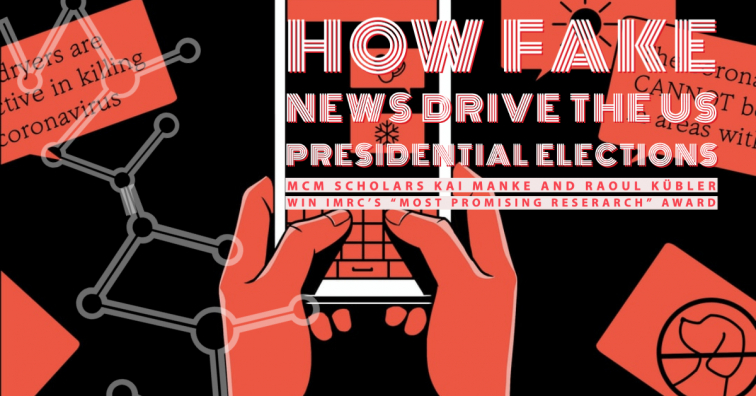MCM Scholars Kai Manke and Raoul Kübler win IMRC's "Most Promising Research" Award

MCM scholars Kai Manke (LMM) and Raoul Kübler (JPM&MA) win together with Professor Koen Pauwels from Northeastern University Boston the inaugural “Most Promising Research” Award of this year’s Interactive Marketing Research conference sponsored by the Lazaridis Institute of Technology.
In their award-winning research study “An Analysis of Social Media Engagement in the Case of the 2016 US Presidential Elections“ the international team examines how the social media strategies of the two presidential candidates drove the election outcome in 2016.
Encouraged by the very positive feedback, the team also used this summer to crawl more than 350 million social media posts to replicate their study for the 2020 election. The results are similarly interesting and astounding.
The latest study indicates that despite the clear lead of Joe Biden in the polls - five days before the election - the race for the future US president still remains open.
This is largely due to the fact that fake news once more play an important role in the current election campaign. The team’s social media analysis finds that the proportion of actively shared fake news has quadrupled since the 2016 election.
Not only the number of fake news increased. Also the number of topics addressed by fake news tremendously increased. While fake news covered only a small number of topics in the 2016 election campaign - mainly Clinton's e-mail affair and her alleged involvement in pedophile circles -, the number of topics in the 2020 election cycle is significantly larger: Using artificial intelligence, the research team analyzed more than 2.4 million fake news links shared by users and identified a total number of 18 topics. The analysis by Professor Raoul Kübler, Professor Koen Pauwels and Kai Manke from Northeastern University (Boston, MA) and the University of Münster (Germany) shows that of the 18 topics, only three (taxes, internal affairs in the White House and the Republican Party) are directed against Donald Trump, while the remaining 15 topics are aimed at harming Democratic challenger Joe Biden.
An econometric analysis shows that fake news regarding "COVID-19" and the popular "Black Lives Matter" movement are particularly helpful for Trump in the polls. The president's supporters try to play down the dangerousness of "COVID-19" and praise Trump's good crisis management. Other posts focus on the alleged relationship between radical left-wing terrorists and the "Black Lives Matter" movement.
However, rumors repeatedly circulated by Trump himself that the mail-in voting would lead to more electoral fraud and jeopardize his re-election show no measurable effect on the daily election polls - despite the spread of misinformation on the subject.
Shortly before the election, the international team has registered an increase in fake news about Joe Biden's son Hunter and his alleged involvement in a Ukrainian corruption scandal. Surprisingly, however, the statistical analysis shows that it is not Trump who benefits from this fake news, but Joe Biden.
That supporters of Trump nevertheless continue to spread this fake news is to be seen against the background of the 2016 election, the researchers explain. In 2016, Clinton's campaign ran off-script during the last two weeks before the election when she lost approval in the polls as a result of the e-mail investigations.
"We think that this narrative has become such a success story among Trump supporters that they are now focusing on e-mails again while ignoring other issues", explains Kai Manke from the University of Münster.
The race for the US presidency hence remains even more open than current polls might suggest. This raises the question of whether Trump might be able to catch up with his Democratic challenger due to a change in focus on sharing fake news. "Against the background that the COVID-19 cases in Europe are increasing again, the topic could gain momentum and encourage people to share more fake news on this topic," explains Professor Kübler from the University of Münster. "Our econometric show that fake news about COVID-19 helps most of all Trump. This could once again significantly influence the race in the final stretch," MCM Professor Raoul Kübler concludes.
A working paper of the award-winning study can be downloaded here.

